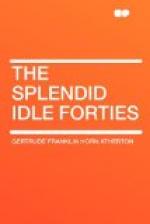THE CONQUEST OF DONA JACOBA
I
A forest of willows cut by a forking creek, and held apart here and there by fields of yellow mustard blossoms fluttering in their pale green nests, or meadows carpeted with the tiny white and yellow flowers of early summer. Wide patches of blue where the willows ended, and immense banks of daisies bordering fields of golden grain, bending and shimmering in the wind with the deep even sweep of rising tide. Then the lake, long, irregular, half choked with tules, closed by a marsh. The valley framed by mountains of purplish gray, dull brown, with patches of vivid green and yellow; a solitary gray peak, barren and rocky, in sharp contrast to the rich Californian hills; on one side fawn-coloured slopes, and slopes with groves of crouching oaks in their hollows; opposite and beyond the cold peak, a golden hill rising to a mount of earthy green; still lower, another peak, red and green, mulberry and mould; between and afar, closing the valley, a line of pink-brown mountains splashed with blue.
Such was a fragment of Don Roberto Duncan’s vast rancho, Los Quervos, and on a plateau above the willows stood the adobe house, white and red-tiled, shaped like a solid letter H. On the deep veranda, sunken between the short forearms of the H, Dona Jacoba could stand and issue commands in her harsh imperious voice to the Indians in the rancheria among the willows, whilst the long sala behind overflowed with the gay company her famous hospitality had summoned, the bare floor and ugly velvet furniture swept out of thought by beautiful faces and flowered silken gowns.
Behind the sala was an open court, the grass growing close to the great stone fountain. On either side was a long line of rooms, and above the sala was a library opening into the sleeping room of Dona Jacoba on one side, and into that of Elena, her youngest and loveliest daughter, on the other. Beyond the house were a dozen or more buildings: the kitchen; a room in which steers and bullocks, sheep and pigs, were hanging; a storehouse containing provisions enough for a hotel; and the manufactories of the Indians. Somewhat apart was a large building with a billiard-room in its upper story and sleeping rooms below. From her window Elena could look down upon the high-walled corral with its prancing horses always in readiness for the pleasure-loving guests, and upon the broad road curving through the willows and down the valley.
The great house almost shook with life on this brilliant day of the month of June, 1852. Don Roberto Duncan, into whose shrewd Scotch hands California had poured her wealth for forty years, had long ago taken to himself a wife of Castilian blood; to-morrow their eldest remaining daughter was to be married to a young Englishman, whose father had been a merchant in California when San Francisco was Yerba Buena. Not a room was vacant in the house. Young people had come from Monterey and San Francisco, Santa Barbara and Los Angeles. Beds had been put up in the library and billiard-room, in the store-rooms and attics. The corral was full of strange horses, and the huts in the willows had their humbler guests.




